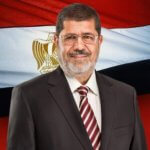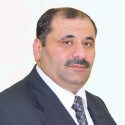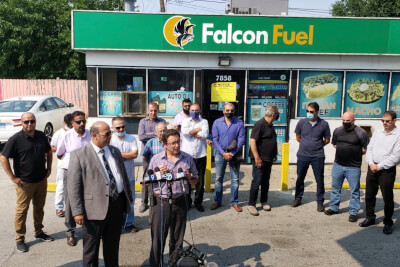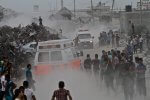![]()
UN and rights groups denounce Egypt’s abuse of Morsi
The United Nations Human Rights joins in denouncing the abuse of former Egyptian President Mohammed Morsi who died in Egyptian custody after being held in solitary confinement for years following the military coup. Morsi had brought on his own troubles by seeking to amend the Egyptian Constitution to impose Sharia Law and give his Muslim Brotherhood more powers.
Morsi served as the fifth President of Egypt, and the first to be elected through a Democratic voting process, from June 30, 2012 to July 3, 2013 when he was overthrown in a coup led by Abdel Fattah al-Sissi, who orchestrated the military coup that took Morsi down.
The US Counciol on Muslim Organizations (USCMO) based in Washington D.C. also issued a statement denouncing the government of Egypt for their abuse of Morsi, who died on June 17, 2019 while in Egyptian custody.
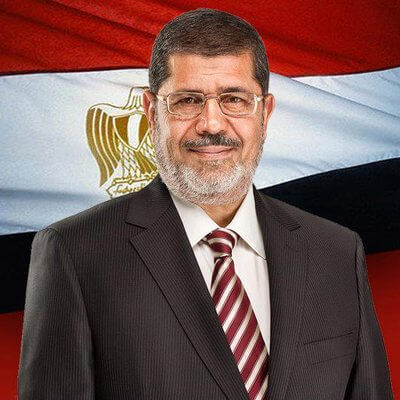
Despite Morsi’s attempts to thwart the Egyptian Democratic System to reinforce controls by the Muslim Brotherhood, Morsi was abused ands mistreated by Al-Assisi in much th esame way that former Egyptian dictator Hosni Mubarak was toppled ands jailed and abused under Morsi’s government.
Egypt continues to siurvive in turmoil and an absence of true Democracy, challenged byt the extremists like the Muslim Brotherhood, and the tyrants like al-Sissi.
Here are statements from the UN Human Rights, and from USCMO:
Statement of the US Council of Islamic Organizations on the June 17 Death of political prisoner and duly elected president of Egypt Mohamed Morsi
The US Council of Muslim Organizations (USCMO), our members, and the entire American Muslim community express our heartfelt condolences to the family, loved ones, and the Egyptian people for the suspect death yesterday of Mohamed Morsi, the first and only duly elected president in Egypt’s history, who gave his last breath as a political prisoner and victim of persecution defending the freedom and right to dignity of his people.
To God we belong, and to Him we return. May God admit him with the truthful, the martyrs, and the righteous into His Gardens of Eternity, beneath which rivers flow.
Tragic as President Morsi’s death is Human Rights Watch Middle East Director Sarah Leah Whitson correctly called it “terrible but entirely predictable” given Egypt’s ruling military junta’s “failure to allow him adequate medical care, much less family visits.” Morsi’s family continually noted his ill health because of the harsh conditions of his imprisonment, including years of solitary confinement.
Egypt’s military dictatorship would feign innocence for Morsi’s death, but as Amy Hawthorne, research director at the Project on Middle East Democracy, points out: “What is known is that Morsi suffered from chronic diabetes and was repeatedly denied medical treatment in inhumane conditions.”
Last year President Morsi’s youngest son, Abdullah, said in an interview with Agence France-Presse that Egypt’s ruling military junta was withholding medical treatment for his political prisoner father’s chronic illnesses, including high blood pressure and diabetes.
USCMO officers and members second Amnesty International’s statement calling for a full investigation of President Morsi’s treatment in prison. Indeed, the “public” collapse and death of President Morsi in court in his soundproofed cage warrant suspicion beyond medical neglect. Consequently, USCMO calls for an independent forensic autopsy to determine President Morsi’s actual cause of death.
President Morsi’s death – which occurred in the same Islamic lunar month, Shawwal, as the infamous Rabaa massacre of 2013 – brings to the fore the long, darkly complicitous muteness of democracies around the world regarding the blatant betrayal of the Egyptian people’s right to self-rule in democracy and their savage suppression since the military coup of July 3, 2013 – again, amid a deafening silence from democracy’s professed champions of basic human freedoms and equality.
The presidents and prime ministers of the world’s leading democracies have welcomed Egypt’s new Pharaoh to plush sit-downs in lush accommodations and with gushing praise. Yet how briskly they overlooked and even more quickly forgot that Abdel Fatah el-Sisi and his council are responsible for the bloodiest civilian massacre by a government in modern history.
These same vociferously democratic leaders and nations have recently commemorated the 30-year anniversary of the action of youthful Chinese protestors for democracy in China’s Tiananmen Square and the subsequent carnage by government troops on June 4, 1989.
Credible estimates put the number of Tiananmen deaths at 400 to 800 in a 24-hour period. Uzbek forces killed a comparable number in the 2005 Andijan Massacre.
Abdel Fatah el-Sisi’s Egyptian troops and operatives slaughtered an unprecedented 817 men, women, and children, each death documented by Human Rights Watch in Rab’a Square alone. Egyptian forces killed these overwhelmingly unarmed and peaceful protesters – and democracy in Egypt – in just 12 hours, between sunrise and sunset, virtually without warning, with probable death estimates exceeding 1,000 murders. This does not include the same-day slaughter of 87 protesters in Nahda Square, and the documented murder of another 246 civilians in the days immediately after the bloodbath at Rab’a.
These systematic, planned and premeditated killings of civilians by Egypt’s military government through unlawful and disproportionate lethal force “likely constitutes crimes against humanity,” according to Human Rights Watch, actionable in both international and many domestic courts under the principle of universal jurisdiction.
In addition, human rights organizations estimate that more than 40,000 political prisoners still languish in Egypt’s notoriously barbarous dungeons.
Meanwhile Sisi has orchestrated a constitutional mockery permitting him to remain “president” of Egypt until 2034 – again, with no word of condemnation from the self-styled Free World’s leaders and administrations.
Morsi’s Nahda, or Renaissance, Project of economic, political, and social elevation and participation for Egypt’s long-suppressed and teaming masses had no chance to take root, blocked by bureaucratic subterfuge from within through the tentacles of an utterly army-corrupted, many-headed hydra of payola ministries; and undermined from without by the Machiavellian machinations of some in the international community.
Yet President Morsi in death makes an indelible impression on Muslims and the freedom longing everywhere. He has borne witness – even unto the last breath – that liberty in one’s practice of faith and way of life within civil society from the oppressive restrictions imposed by illegitimate authority cannot be taken from the breast of the truly free and is indeed worth life itself. For it is even as the Quran tells it: Persecution is far more grievous a sin than killing (Sûrat Al-Baqarah, 2:191).
We ask God to receive Mohamed Morsi with mercy, to comfort his family and loved ones in their loss and great tribulation, and to deliver humanity to justice, fellow feeling, and the upright way.
Comment on the treatment and death in custody of former Egyptian President Mohammed Morsi
The following comment is attributable to Rupert Colville, Spokesperson for the Office of the UN High Commissioner for Human Rights
“As former President Mohammed Morsi was in the custody of the Egyptian authorities at the time of his death, the State is responsible for ensuring he was treated humanely and that his right to life and health were respected. Any sudden death in custody must be followed by a prompt, impartial, thorough and transparent investigation carried out by an independent body to clarify the cause of death. These are general principles elaborated by various international human rights bodies, including the African Commission on Human Rights, with which we fully concur.
“States, including Egypt, that have ratified the International Covenant on Civil and Political Rights, also have a heightened duty of care to take any necessary measures to protect the lives of individuals deprived of their liberty. In the words of the UN Human Rights Committee — which monitors the implementation of the Covenant — by arresting, detaining, imprisoning or otherwise depriving individuals of their liberty, States parties assume the responsibility to care for their life and bodily integrity.
“Concerns have been raised regarding the conditions of Mr. Morsi’s detention, including access to adequate medical care, as well as sufficient access to his lawyers and family, during his nearly six years in custody. He also appears to have been held in prolonged solitary confinement. The investigation should therefore also encompass all aspects of the authorities’ treatment of Mr. Morsi to examine whether the conditions of his detention had an impact on his death.
“Rule 24 of the Mandela Rules (the UN Standard Minimum Rules for the Treatment of Prisoners) states the following: ‘The provision of health care for prisoners is a State responsibility. Prisoners should enjoy the same standards of health care that are available in the community, and should have access to necessary health-care services free of charge without discrimination on the grounds of their legal status.’
“Mandela Rule 27 states that ‘All prisons shall ensure prompt access to medical attention in urgent cases. Prisoners who require specialized treatment or surgery shall be transferred to specialized institutions or to civil hospitals. Where a prison service has its own hospital facilities, they shall be adequately staffed and equipped to provide prisoners referred to them with appropriate treatment and care.’
“On the subject of investigations, Mandela Rule 71 says the following: ‘Notwithstanding the initiation of an internal investigation, the prison director shall report, without delay, any custodial death, disappearance or serious injury to a judicial or other competent authority that is independent of the prison administration and mandated to conduct prompt, impartial and effective investigations into the circumstances and causes of such cases.’
“In light of all the above, we believe it is clear there must be a thorough independent inquiry into the circumstances of Mr. Morsi’s death, including the conditions of his detention. The investigation should be carried out by a judicial or other competent authority that is independent of the detaining authority and mandated to conduct prompt, impartial and effective investigations into the circumstances and causes of his death.”


- Israelisnipers shooting and killing hospital workers in Gaza - December 11, 2023
- CAIR Condemns Israeli Executions of Wounded, Unarmed Palestinian in West Bank - December 11, 2023
- Arab and Muslim American voters face a “simple choice” between Biden’s inhumanity and Trump’s edgy politics - December 9, 2023













